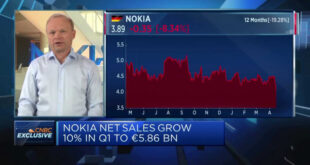
Brendan Smialowski | AFP | Getty Images
President Donald Trump boards Air Force One at Andrews Air Force Base July 24, 2018, in Maryland.
Mike Gallagher, managing director at financial consultancy Continuum Economics, played down stellar predictions of growth by Donald Trump, adding that recent polices implemented by the U.S. president would only provide short-term benefits for the economy.
Trump told talk show host Sean Hannity on Friday that the U.S. could reach historic growth rates if the trade deficit is cut in half. His remarks followed a data release showing that the U.S. grew at 4.1 percent in the second quarter of the year. He claimed that the country could reach GDP growth of 8 or 9 percent, which is far higher than economists predict. He did not specify whether he was referring to an annual or quarterly growth rate.
When asked about the 8 and 9 percent figure, Gallagher told CNBC: “No, no, not at all.”
“You’re going to find it difficult to even get sort of 3 percent on a long-term basis,” he said.
The Trump administration put forward a tax overhaul at the end of last year, which has supported the economy. In general, companies have more money to invest and have raised salaries in some cases; giving citizens additional income to spend.
According to Gallagher, this policy has been the driver of the current strong performance of the U.S. economy; but its benefits are only temporary.
“There’s a tailwind at the moment because of the fiscal policy changes that they have made, because of the tax cuts that get you into 2019 but then once you’re getting into late (20)19, (20)20 fiscal policy actually turns contractionary rather than expansionary,” Gallagher said, adding that “with the (Federal Reserve) continuing to hike, 2020 is going to really struggle to get to 3 percent and to be honest it is going to be closer to 2 rather than 3.”
One of the main arguments against tax cuts is their impact on the government deficit. Because companies and people are paying less taxes, the government is receiving less money. At the same time, the U.S. government hasn’t cut spending, meaning that it has less money but the same expenses, which in turn pushes its deficit higher.
 EU News Digest Latest News & Updates
EU News Digest Latest News & Updates


